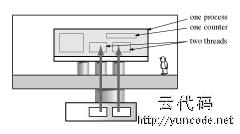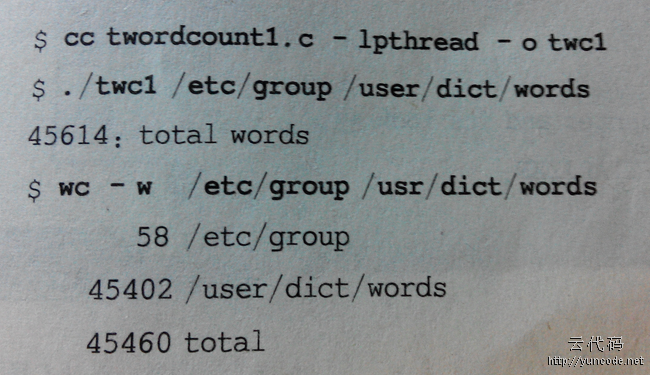
洋葱码农 - 云代码空间
—— 一直在改,从未有变
 —图1
—图1/* twordcount1.c - threaded word counter for two files. Version 1 */
#include <stdio.h>
#include <pthread.h>
#include <ctype.h>
int total_words ;
main(int ac, char *av[])
{
pthread_t t1, t2; /* two threads */
void *count_words(void *);
if ( ac != 3 ){
printf("usage: %s file1 file2\n", av[0]);
exit(1);
}
total_words = 0;
pthread_create(&t1, NULL, count_words, (void *) av[1]);
pthread_create(&t2, NULL, count_words, (void *) av[2]);
pthread_join(t1, NULL);
pthread_join(t2, NULL);
printf("%5d: total words\n", total_words);
}
void *count_words(void *f)
{
char *filename = (char *) f;
FILE *fp;
int c, prevc = '\0';
if ( (fp = fopen(filename, "r")) != NULL ){
while( ( c = getc(fp)) != EOF ){
if ( !isalnum(c) && isalnum(prevc) )
total_words++;
prevc = c;
}
fclose(fp);
} else
perror(filename);
return NULL;
}

/* twordcount2.c - threaded word counter for two files. */
/* version 2: uses mutex to lock counter */
#include <stdio.h>
#include <pthread.h>
#include <ctype.h>
int total_words ; /* the counter and its lock */
pthread_mutex_t counter_lock = PTHREAD_MUTEX_INITIALIZER;
main(int ac, char *av[])
{
pthread_t t1, t2; /* two threads */
void *count_words(void *);
if ( ac != 3 ){
printf("usage: %s file1 file2\n", av[0]);
exit(1);
}
total_words = 0;
pthread_create(&t1, NULL, count_words, (void *) av[1]);
pthread_create(&t2, NULL, count_words, (void *) av[2]);
pthread_join(t1, NULL);
pthread_join(t2, NULL);
printf("%5d: total words\n", total_words);
}
void *count_words(void *f)
{
char *filename = (char *) f;
FILE *fp;
int c, prevc = '\0';
if ( (fp = fopen(filename, "r")) != NULL ){
while( ( c = getc(fp)) != EOF ){
if ( !isalnum(c) && isalnum(prevc) ){
pthread_mutex_lock(&counter_lock);
total_words++;
pthread_mutex_unlock(&counter_lock);
}
prevc = c;
}
fclose(fp);
} else
perror(filename);
return NULL;
}
 _图6
_图6/* twordcount3.c - threaded word counter for two files.
* - Version 3: one counter per file
*/
#include <stdio.h>
#include <pthread.h>
#include <ctype.h>
struct arg_set { /* two values in one arg */
char *fname; /* file to examine */
int count; /* number of words */
};
main(int ac, char *av[])
{
pthread_t t1, t2; /* two threads */
struct arg_set args1, args2; /* two argsets */
void *count_words(void *);
if ( ac != 3 ){
printf("usage: %s file1 file2\n", av[0]);
exit(1);
}
args1.fname = av[1];
args1.count = 0;
pthread_create(&t1, NULL, count_words, (void *) &args1);
args2.fname = av[2];
args2.count = 0;
pthread_create(&t2, NULL, count_words, (void *) &args2);
pthread_join(t1, NULL);
pthread_join(t2, NULL);
printf("%5d: %s\n", args1.count, av[1]);
printf("%5d: %s\n", args2.count, av[2]);
printf("%5d: total words\n", args1.count+args2.count);
}
void *count_words(void *a)
{
struct arg_set *args = a; /* cast arg back to correct type */
FILE *fp;
int c, prevc = '\0';
if ( (fp = fopen(args->fname, "r")) != NULL ){
while( ( c = getc(fp)) != EOF ){
if ( !isalnum(c) && isalnum(prevc) )
args->count++;
prevc = c;
}
fclose(fp);
} else
perror(args->fname);
return NULL;
}